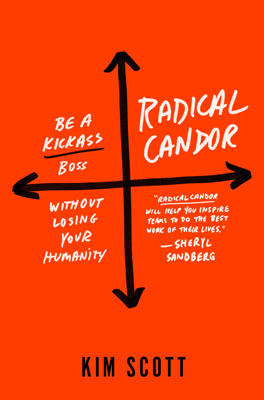Summary
"Radical Candor" is a comprehensive guide for effective management and leadership that revolves around the pivotal concept of Radical Candor - an approach that combines Care Personally and Challenge Directly. Here’s a concise overview of the main ideas from the book:
Core Concepts and Practices
Building Radically Candid Relationships: Managers are encouraged to bring their whole self to work and to foster personal relationships with their team members. This involves engaging genuinely with each individual and maintaining clear, direct communication. By nurturing strong relationships founded on trust and direct feedback, managers can more effectively guide and motivate their team.
Balancing Guidance: Guidance should consist of both praise and criticism, balanced in a way that shows personal care while also challenging team members directly. This method helps avoid the pitfalls of Ruinous Empathy (all care, no challenge), Obnoxious Aggression (all challenge, no care), and Manipulative Insincerity (neither care nor challenge).
Understanding Individual Motivations: Managers should differentiate between team members who are content with their current roles ("rock stars") and those seeking growth and new challenges ("superstars"). Aligning team roles and challenges according to individual growth trajectories is essential for personal and organizational success.
Driving Results Through Collaboration: Effective leadership involves collaborative decision-making processes that respect contributions from all team members. Kim Scott emphasizes using systems like the "Get Stuff Done" (GSD) Wheel to ensure thorough and inclusive approaches from ideation to execution.
Feedback-Rich Environment: Encouraging an environment where feedback flows freely in all directions enhances communication and performance. Regular career conversations and feedback mechanisms, such as "Management Fix-It" weeks or continuous feedback boxes, help maintain this culture.
Implementing Radical Candor
Implementing Radical Candor involves understanding the nuances of human interaction within professional settings and adapting communications and management styles accordingly. The tools and techniques provided in the latter part of the book, such as structured feedback sessions, career development conversations, and balanced team compositions, facilitate these implementations. Leaders are encouraged to maintain a hands-on approach in fostering a transparent, feedback-rich work environment, while simultaneously emphasizing flexibility and acknowledging cultural and individual diversity.
Strategic Management and Cultural Influence
Finally, achieving superior results isn’t only about managing people and projects efficiently but also about influencing and cultivating a supportive and productive organizational culture. By actively involving in routine team interactions and strategically using various types of meetings, leaders can reinforce a cohesive culture, ensuring that team efforts are aligned towards collective goals, thus translating Radical Candor into everyday practices.
In essence, "Radical Candor" provides a blueprint for building supportive, responsive, and effective teams and organizations through a blend of personal engagement and candid, respectful communication.
Per-chapter summary
- Build Radically Candid Relationships: Bringing your whole self to work
- Get, Give, and Encourage Guidance: Creating a culture of open communication
- Understand What Motivates Each Person on Your Team: Helping people take a step in the direction of their dreams
- Drive Results Collaboratively: Telling people what to do doesn’t work
- Relationships: An approach to establishing trust with your direct reports
- Guidance: Ideas for getting/giving/encouraging praise & criticism
- Team: Techniques for avoiding boredom and burnout
- Results: Things you can do to get stuff done together—faster
